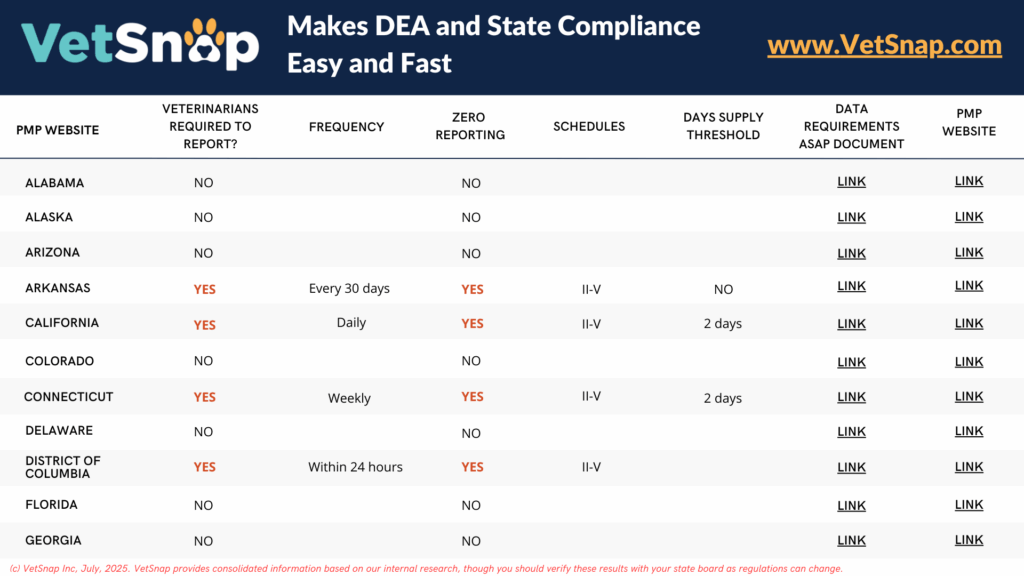Home / Product News & Features / What is the Prescription Monitoring Program (PMP/PDMP), and how do you effortlessly comply with your state’s requirements?
What are your PMP reporting requirements?
PMP reporting requirements vary by state. In some states, veterinarians must report detailed information about each dispensed controlled substance—including the medication, dosage, dispenser, patient, and client. Some states even require “zero reports” when no controlled substances are dispensed.
States regularly update their reporting rules, including thresholds for days’ supply and reporting frequency. The best starting point is to review your state’s official guidelines.
VetSnap offers consolidated state-specific information and helpful links based on our internal research. However, we recommend confirming all details with your state board, as regulations can change.

Get PMP rules overview for all 50 states with links to state websites and data submission guides:
Submitting reports through your state’s PMP portal can be tedious and time-consuming — especially when done manually for every prescription.
Meet VetSnap’s PMP Assistant — built specifically for veterinary teams to make PMP reporting fast, accurate, and stress-free. It works alongside your controlled substance log, using data you already record to streamline the entire process.
- Customize templates to match your state’s requirements
- Tag dispensed medications as you log them
- Instantly generate a ready-to-upload report
- Track and manage pending submissions in one simple view
No more repetitive data entry. Just a few clicks, and you’re compliant. VetSnap helps you stay audit-ready — without the hassle.
As PMP reporting requirements become more complex, many veterinary practices have stopped dispensing controlled substances altogether — not because they want to, but because compliance feels too time-consuming and costly.
In some cases, the cost of compliance outweighs the cost of the medication itself. That’s why many hospitals in mandatory reporting states opt to prescribe out instead. But prescribing isn’t always easier as far as it can lead to time-consuming phone calls, delays in filling prescriptions, and lost revenue.
VetSnap’s PMP Assistant changes that. With our tool, you can:
- Automate up to 90% of your PMP reporting
- Save time while ensuring accurate, on-time submissions
- Make in-clinic dispensing practical again
Dispensing on-site means better care, faster treatment, and higher revenue — all without the compliance headache. VetSnap helps you do it all, simply and confidently.
VetSnap PMP Assistant absolutely can be used in Standalone mode with your VetSnap Controlled Drug Logbook. For hospitals that do PMP manually, this combination will still save significant time and streamline the compliance process.
Regulations regarding dispensing limitations can vary based on state law as well as federal regulations. It is advised to reference CFR Title 21 Chapter 2 to ensure federal compliance, but also reach out to state departments to ensure compliance with state level regulations as they may differ from federal regulations.
VetSnap PMP Assistant is your smart, automated, and guided tool that helps you simplify PMP reporting. The reports generated by PMP Assistant are compatible with your state’s reporting platform, and have some error checking processes built in to ensure your submission isn’t kicked back with some common basic mistakes. However, you, as the staff of the hospital, are still responsible for ensuring reports that are being put together are accurate and submitted to your state’s portal in a timely manner.
Still Confused about PMP reporting?
Get clarity in just 20 minutes!
Our educational video explains everything: why it exists, who’s responsible & how to stay compliant without stress.
• History and purpose of PMP
• Why reporting is crucial for compliance
• Smooth workflow tips
Enjoy watching with our experts, Cass & Courtney!


